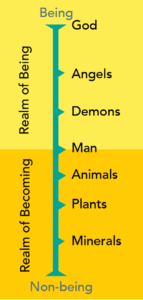
Several times in the past, biologists have committed themselves to the erroneous idea that life can be organized on a ladder of lower to higher organisms. This idea lies at the heart of Aristotle’s Great Chain of Being (see right).
Similarly, it’s easy to misinterpret phylogenies as implying that some organisms are more “advanced” than others; however, phylogenies don’t imply this at all.
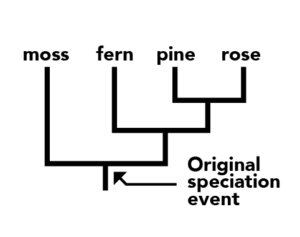 In this highly simplified phylogeny, a speciation event occurred resulting in two lineages. One led to the mosses of today; the other led to the fern, pine, and rose. Since that speciation event, both lineages have had an equal amount of time to evolve. So, although mosses branch off early on the tree of life and share many features with the ancestor of all land plants, living moss species are not ancestral to other land plants. Nor are they more primitive. Mosses are the cousins of other land plants.
In this highly simplified phylogeny, a speciation event occurred resulting in two lineages. One led to the mosses of today; the other led to the fern, pine, and rose. Since that speciation event, both lineages have had an equal amount of time to evolve. So, although mosses branch off early on the tree of life and share many features with the ancestor of all land plants, living moss species are not ancestral to other land plants. Nor are they more primitive. Mosses are the cousins of other land plants.
So when reading a phylogeny, it is important to keep three things in mind:
- Evolution produces a pattern of relationships among lineages that is tree-like, not ladder-like.
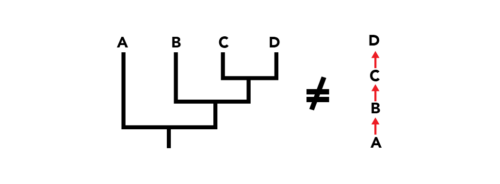
- Just because we tend to read phylogenies from left to right, there is no correlation with level of “advancement.”
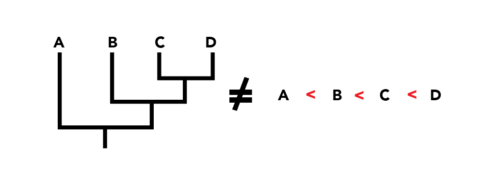
- For any speciation event on a phylogeny, the choice of which lineage goes to the right and which goes to the left is arbitrary. The following phylogenies are equivalent:
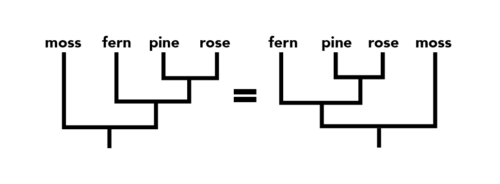
Biologists often put the clade they are most interested in (whether that is bats, bedbugs, or bacteria) on the right side of the phylogeny.
Misconceptions about humans
The points described above cause the most problems when it comes to human evolution. The phylogeny of living species most closely related to us looks like this:
It is important to remember that: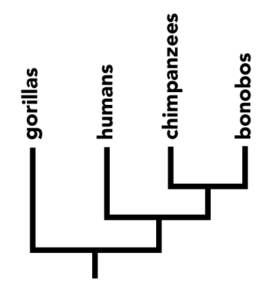
-
- Humans did not evolve from chimpanzees. Humans and chimpanzees are evolutionary cousins and share a recent common ancestor that was neither chimpanzee nor human.
- Humans are not “higher” or “more evolved” than other living lineages. Since our lineages split, humans and chimpanzees have each evolved traits unique to their own lineages.
Learn more about common misconceptions regarding evolutionary trees.
Teach your students about evolutionary relationships and phylogenetics:
- What did T. rex taste like?, a web activity for grades 6-12
Find additional lessons, activities, videos, and articles that focus on phylogenetics.
